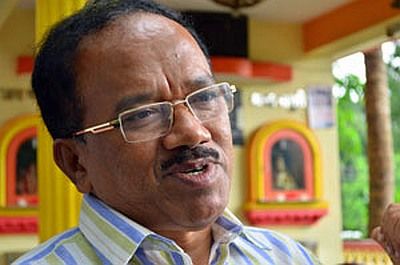 | « Back to article | Print this article |
 Goa Health Minister Laxmikant Parsekar was on Saturday sworn in as the new chief minister.
Goa Health Minister Laxmikant Parsekar was on Saturday sworn in as the new chief minister.
Parsekar’s name was finalised during the Bharatiya Janata Party legislature party meeting, snuffing out any challenge from Deputy CM Francis D'Souza.
Parsekar succeeds Manohar Parrikar who resigned earlier in the day and is set to join the Union cabinet.
His name was proposed by Parrikar and seconded by the Deputy chief minister D'Souza, who had earlier staked claim to the post on ground of seniority.
However, he backed Parsekar after being mollified by the party leadership.
Who is Laxmikant Parsekar?
Branded a 'rebel', Parsekar started his political journey in the 1980s, treading a path that his family strongly disapproved of when he had his first tryst with the hustings in 1988 from Mandrem constituency as a BJP candidate.
His farming family was a staunch supporter of then politically powerful regional outfit--Maharashtrawadi Gomantak Party.
He was pitted against Ramakant Khalap, an influential politician in the state polity, and lost.
Parsekar's decision to contest as a candidate of the BJP, then a virtual a non-entity in the coastal state, was received with shock by his family and the village, an MGP stronghold.
"I had almost packed my bag and left the house as my family refused to digest the fact that I am contesting against MGP candidate Ramakant Khalap. It was in the year 1988 when BJP was hardly known in the state.
"I was looked upon as a rebel," Parsekar told PTI.
A postgraduate in science, Parsekar, initially took up a teaching job and started out as an RSS volunteer in Pernem taluka.
He began working for BJP in late 1980s and was instrumental in building the party's support base along with veterans like Parrikar, Rajendra Arlekar, now Goa assembly Speaker, and Sripad Naik, Union Minister for Tourism.
"I lost miserably from Mandrem in 1988. My entire family rooted for MGP. Even one of the trucks used by the MGP candidate for campaigning was owned by my father," said Parsekar, who was health minister in the Parrikar government.
Luck failed him again in the assembly polls in 1999. By then BJP had become an established player in the coastal state, notorious for political volatility and defections, which often led to toppling of governments.
"My only consolation was that I managed to save my deposit," Parsekar said.
Undeterred by the setback, he again contested the assembly election in 2002 and emerged a giant killer, defeating MGP's Khalap, then considered "invincible", by a wafer-thin margin of 750 votes.
There was no looking back for Parsekar ever since.
In 2007, he doubled his victory margin and was re-elected in 2012 when BJP posted a remarkable victory, winning 21 of the 40 assembly seats.
It was a landmark election as after a long time a party had won a clear majority in the assembly, fuelling hopes of political stability.
Parsekar, who then headed the Goa unit of BJP, was rewarded with a cabinet berth in the BJP-MGP coalition government led by Parrikar.
Parsekar's unflinching loyalty to BJP and strong RSS links saw him quell a challenge from Deputy Chief Minister Francis D'Souza and leapfrog to the CM's chair.